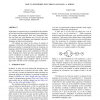Free Online Productivity Tools
i2Speak
i2Symbol
i2OCR
iTex2Img
iWeb2Print
iWeb2Shot
i2Type
iPdf2Split
iPdf2Merge
i2Bopomofo
i2Arabic
i2Style
i2Image
i2PDF
iLatex2Rtf
Sci2ools
129
click to vote
WSC
2007
2007
How to synthesize nets from languages: a survey
In this paper we present a survey on methods for the synthesis of Petri nets from behavioral descriptions given as languages. We consider place/transition Petri nets, elementary Petri nets and Petri nets with inhibitor arcs. For each net class we consider classical languages, step languages and partial languages as behavioral description. All methods are based on the notion of regions of languages. We identify two different types of regions and two different principles of computing from the set of regions of a language a finite Petri net generating this language. For finite or regular languages almost each combination of Petri net class, language type, region type and computation principle can be considered to compute such a net. Altogether, we present a framework for region-based synthesis of Petri nets from languages which integrates almost all known approaches and fills several remaining gaps in literature.
Elementary Petri Nets | Modeling And Simulation | Petri Nets | Place/transition Petri Nets | WSC 2007 |
Related Content
| Added | 02 Oct 2010 |
| Updated | 02 Oct 2010 |
| Type | Conference |
| Year | 2007 |
| Where | WSC |
| Authors | Robert Lorenz, Sebastian Mauser, Gabriel Juhás |
Comments (0)

